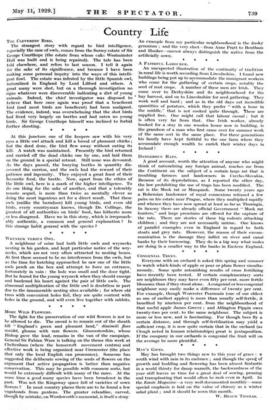CONGENIAL TREES.
Everyone with an orchard is asked this spring and summer to watch which kinds of apple or pear or plum flower simulta- neously. Some quite astonishing results of cross fertilizing have recently been tested. If certain complementary sorts are neighbours they may have even fifty per cent. more fertile blossoms than if they stood alone. A congenial or less congenial neighbour may easily make a difference of twenty per cent. For example, though Worcester Pearmain (one of our oldt-4 as one of earliest apples) is more than usually self-fertile, it benefited by nineteen per cent. from the neighbourhood of that useful apple James Greeve ; and Allington Pippin owes twenty-two per cent. to the same neighbour. The subject is more or less new, and is fascinating. For though bees fly a certain distance, and through self-fertilization may yield a sufficient crop, it is now quite certain that in the orchard (as Clough noted in human relationships) great is juxtaposition. If the company in our orchards is congenial the fruit will on the average be more plentiful.










































 Previous page
Previous page